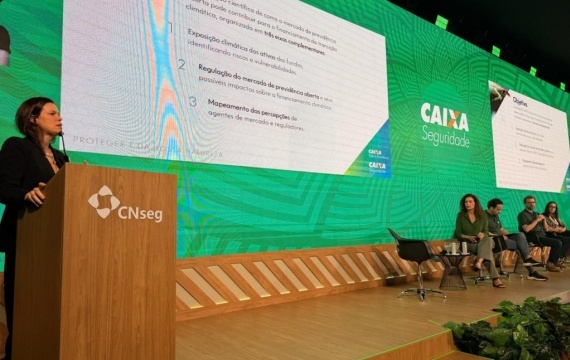Researcher Highlights Challenges and Opportunities for Open Pension Funds in COP30 Debate
On November 14, the Insurance House at COP30 hosted the panel “Open Complementary Pension Funds and Climate Financing”, which gathered specialists to analyze the role of open pension funds in mobilizing long-term capital for Brazil’s climate agenda. The discussion featured Annelise Vendramini, researcher at the São Paulo School of Business Administration (FGV EAESP), who joined other experts to address transition and physical risks, climate alignment criteria, regulatory challenges, and sustainable financing prospects for the coming years.
Annelise presented the results of a study developed in partnership with the Caixa conglomerate and the Institute for Climate and Society (iCS). The analysis combined a diagnosis of climate allocation in portfolios, an assessment of the regulatory and self-regulatory environment, and interviews with managers, regulators, and market stakeholders.
The data revealed that, on average, between 10% and 12% of the net assets of open pension funds are currently aligned with the climate agenda, highlighting significant room for expansion. According to Annelise:
“The combination of regulatory analysis, portfolio diagnosis, and qualified market input was essential to understand the complexity of the topic and the possible paths to increase sustainable allocation.”
In her presentation, the researcher emphasized that the supply of sustainable assets remains limited, both in volume and quality, and that the lack of transparency in climate-related information makes risk assessment difficult for investors.
The study also identified short-term pressures on managers, even in products designed for long-term horizons, and pointed out that Brazil’s regulatory framework already allows for the incorporation of ESG criteria, provided it is accompanied by robust transparency practices and measures to mitigate greenwashing.
The panel discussion reinforced that advancing the climate finance agenda depends on expanding the availability of sustainable financial instruments, improving the quality of disclosed data, and consolidating regulatory references aligned with international best practices.
The debate featured Gustavo Portela, CEO of Caixa Seguridade; Jean-Christophe Hamery, CEO of Caixa Vida e Previdência; and Maria Netto, President of the Institute for Climate and Society (iCS). Experts also stressed that sovereign sustainable bonds, updated regulatory frameworks, and greater standardization of information can strengthen the environment for channeling private capital into climate mitigation and adaptation initiatives.
Watch the full panel here.
Full coverage of Fundação Getulio Vargas’ participation in COP30, including agendas, exclusive content, and contributions from the institution’s researchers to global climate action, is available on the FGV Climate Agenda Platform. The opinions expressed in this publication are the sole responsibility of the contributing researchers and do not necessarily reflect the official position of Fundação Getulio Vargas.
